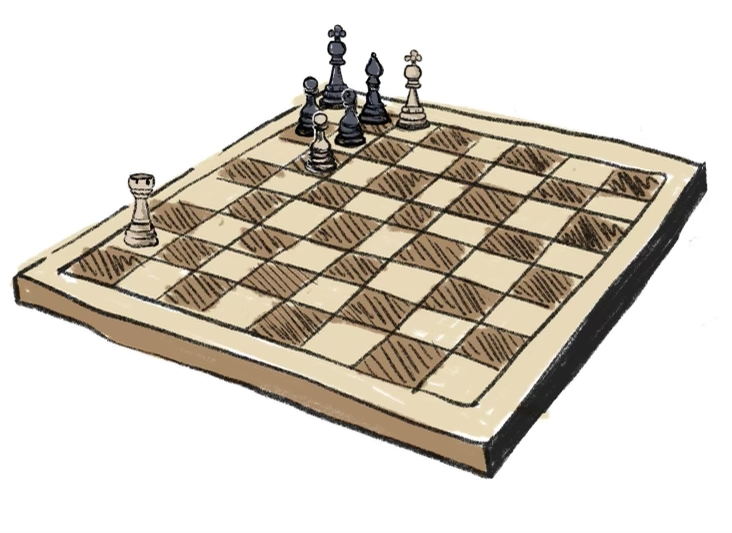FIDE’s handling of the WCC shows that chess needs to change
This illustration by Cici Fang ’24 is of a famous puzzle composed by chess master Paul Morphy, with white to move and mate in two. Can you spot the solution?
On April 30th, Chinese Grandmaster Ding Liren defeated Russian Grandmaster Ian Nepomniachtchi in the rapid tiebreaks portion of the WCC (World Chess Championship), becoming the 17th classical World Chess Champion. However, this title does not come without controversy. On July 20, 2022, Magnus Carlsen, the world’s top-rated chess player since 2011 and World Champion since 2013, announced on his podcast that he would not be defending his title against Ian Nepomniachtchi, who had won the Candidates Tournament, the tournament traditionally used to determine the challenger for the WCC match. Ding then qualified for the Championship match as the runners-up of the Candidates Tournament.
This was not surprising news for those who follow chess. Carlsen had hinted several times since winning the WCC in 2021 that he would not be defending his title. “It’s been clear to me for most of the year that this world championship should be the last,” said Carlsen in December 2021. “It doesn’t mean as much any more as it once did. I haven’t felt that the positive outweighs the negative.”
While the fact that Nepomniachtchi, who would have been challenging Carlsen for the second time for the title, had just been crushed in an embarrassing 7.5-3.5 defeat in the previous Championship certainly did not help retain Carlsen’s interest in the WCC, it certainly was not the only reason. Carlsen has always opposed the current WCC format, which he believes heavily favors the defending Champion–himself–and gives small advantages to other top players. “There should be a new World Championship cycle system, which is both balanced and fair,” Carlsen said in 2015, “I have long thought that moving to an annual knock-out event, similar to the World Cup, would be more equitable.”
Carlsen’s complaints have fallen on deaf ears with FIDE, the governing body of the chess world. While it obviously represents the highest level of chess in the world, the WCC itself is not particularly interesting–two top grandmasters come together to play 14 classical games over 20-odd days, with each game usually taking between 4 to 6 hours, and at times taking almost an hour per move. While certainly widely watched due to its importance and of interest to top chess players, casual players and even some experienced players usually find the match boring, as the intricacies of the game can be very difficult to understand. Most matches end in a draw, and not in an exciting way–threefold repetitions or draws by agreement in the middle game are exceedingly common. While this year’s match was admittedly electrifying to watch, it is certainly not the norm; in most cases, winning a game or two is enough to win the match. The Candidates Tournament, on the other hand, is much more exciting–there are more games to watch, less draws, and more potential opponents for each player that keeps the game fresh–all while keeping the level of play very high.
FIDE has kept the World Chess Championship for the sake of tradition, as its Champion-versus-challenger format has been in place since 1886. However, the chess world has changed drastically since then, in part due to the “chess boom” caused by the COVID-19 pandemic. Coverage of chess tournaments is widespread, whereas previously only top chess players paid attention to such events. Chess needs to cater to the casual viewer, not the seasoned Grandmaster, and the way to do it is to make the World Chess Championship a round robin including the defending Champion and players who would have otherwise qualified for the Candidates Tournament. This way, the level of the Championship will be preserved, all while making the tournament more exciting and removing the overwhelming advantage that defending Champions currently have.
























